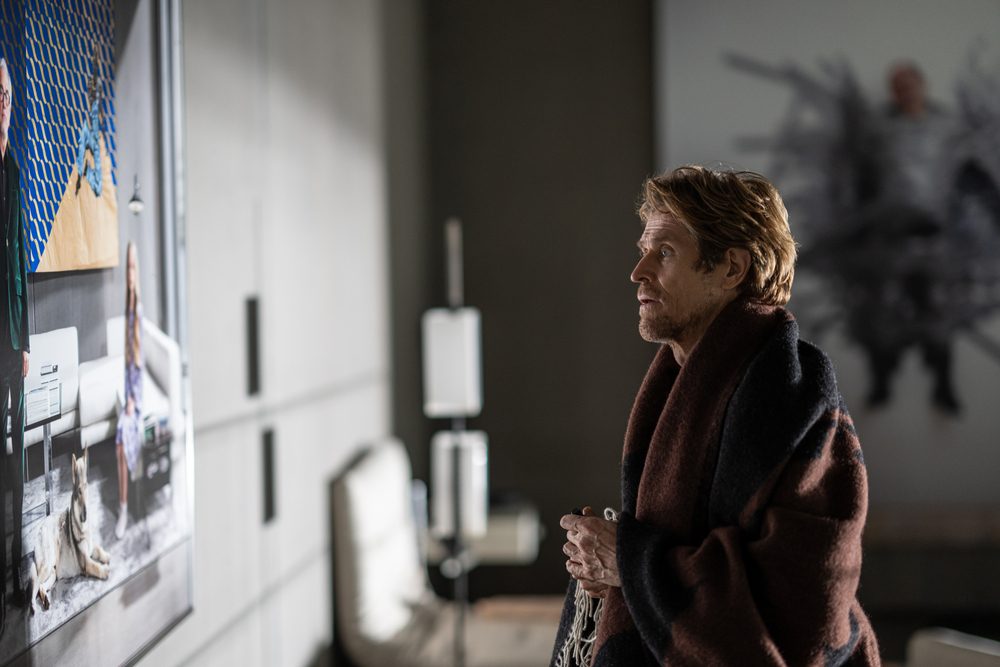Capsule reviews for March 17

Willem Dafoe stars in INSIDE. (Photo: Focus Features)
Country Gold
Finding its own offbeat rhythm, this soulful if self-indulgent satire about fame and the artistic process is deliberately paced yet rewards patience. It follows an up-and-coming country crooner named Troyal (Mickey Reece, who also directed) who receives an unlikely invitation from his icon, George Jones (Ben Hall) — come to Nashville and party the night away before he’s cryogenically frozen the next day. Their surreal evening is both deliriously wild and quietly reflective as fantasy and reality begin to blur. Aside from its excessive idiosyncrasies, the latest low-budget oddity from Reece (Agnes), shot in black-and-white, plays like a classic country ballad until it audaciously defies convention. (Not rated, 84 minutes).
Inside
Willem Dafoe is the right guy for a solo character study in which body language and facial expressions generally substitute for dialogue, although this heist drama is more tedious than profound. He plays an art thief who becomes trapped inside a high-tech and sound-proof penthouse by malfunctioning smart technology. With the owner out of town, the water shut off, the thermostat gone haywire, and no way of communicating to the outside world, he becomes desperate to escape. While we might feel his anguish and admire his resilience, any rooting interest dwindles as the film struggles to sustain tension at feature length. But the paintings are pretty. (Rated R, 105 minutes).
Pinball: The Man Who Saved the Game
You don’t need to be an old arcade nerd with a roll of quarters to appreciate this affectionate biopic about Roger Sharpe, a mustachioed Chicago native obsessed with pinball. In the 1970s, Roger (Mike Faist) was working as a journalist in New York when he learned his favorite game had been banned for decades in the city because of alleged connections to organized crime. So he campaigned to persuade closed-minded public officials to return pinball to the masses. Although it strains to portray Roger as an underdog hero, the crowd-pleasing film is steeped in nostalgic charm while balancing its surface quirks with an underlying sweetness. (Rated PG-13, 93 minutes).
Rodeo
Despite some narrative missteps, this gritty and immersive French thriller provides a visceral glimpse into the allure and danger of outlaw motorcycle stunt culture. It’s also a compelling drama about equality told through the eyes of Julia (Julie Ledru), a rebellious outcast eager to join a suburban biker gang. But besides refining her skills as a gearhead and a cunning thief, she must hold her own while infiltrating a male-dominated crew. That leads to clashes and eventual acceptance, until a tragedy changes everything. The film bursts with raw energy, marking a stylish debut for director Lola Quivoron, while Ledru finds hard-earned sympathy in a tough-minded heroine. (Not rated, 106 minutes).
Supercell
Whenever the skies are calm, this eye-rolling thriller about a family of Texas storm chasers loses its thunder. It follows a teenager (Daniel Diemer) trying to follow in the footsteps of his late father, a legendary daredevil who lost his life to a massive tornado. Trying to satisfy his own curiosity and keep that legacy alive, he reconnects with an estranged uncle (Skeet Ulrich) to track ominous weather systems through the plains. With meteorological mixed messages and cringeworthy dialogue, the film never gets the adrenaline pumping as intended as it funnels toward a ridiculous climax. The cast includes Alec Baldwin and the late Anne Heche. (Rated PG-13, 101 minutes).
Wildflower
It might be based on a true story, but the dysfunctional family dynamics in this coming-of-age comedy-drama feel more manufactured than authentic. It chronicles the upbringing of a teenager (Kiernan Shipka) with two intellectually disabled parents, prompting her to become their primary caretaker at a young age. As she grows older and falls for a supportive boyfriend (Charlie Plummer), she wonders whether her circumstances and bickering relatives might derail her dreams. Although the intentions are heartfelt, the film emphasizes exaggerated eccentricities rather than exploring issues of acceptance and appreciation with meaningful subtlety or sincerity. The ensemble cast includes Alexandra Daddario, Jean Smart, and Jacki Weaver. (Rated R, 106 minutes).